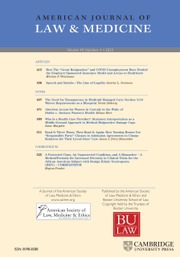No CrossRef data available.
Health Care Policy and Politics: Does the Past Tell Us Anything About the Future?
Published online by Cambridge University Press: 06 May 2021
Abstract
The American health care delivery system, and the attitude of the public toward that system, have undergone considerable change during the past two decades. According to the author, the belief during the 1960s that adequate funds were available to broaden access to health services, to enhance their quality and availability, and to support medical innovation, gave way during the 1970s to an awareness of limited resources, to a skepticism about the motives and competence of established institutions, and to a conviction that the system's problems were too complex to be solved easily, if at all. Moreover, the author states, the system has become fragmented and highly competitive; the respect formerly accorded both professionals and institutions has deteriorated; and the government's role in health care delivery is being challenged.
The result, the author says, may well be a paralysis of policymaking in health planning, as exemplified by the failure of both public and private institutions to achieve the cost-containment goals of the last decade, either through regulation or competition.
To gain perspective on these problems and to determine the direction of the health care delivery system for the 1980s, the author calls for a national health care debate. He suggests four concepts that should be included in such a debate, and recommends a new context of pragmatic idealism in which to conduct it.
- Type
- Comment
- Information
- Copyright
- Copyright © American Society of Law, Medicine and Ethics and Boston University 1980
Footnotes
This Comment was developed from a speech given by the author at Laventhol and Horwath's Twelfth Annual Symposium on Health Care, in Chicago, Illinois, on October 25, 1979.


